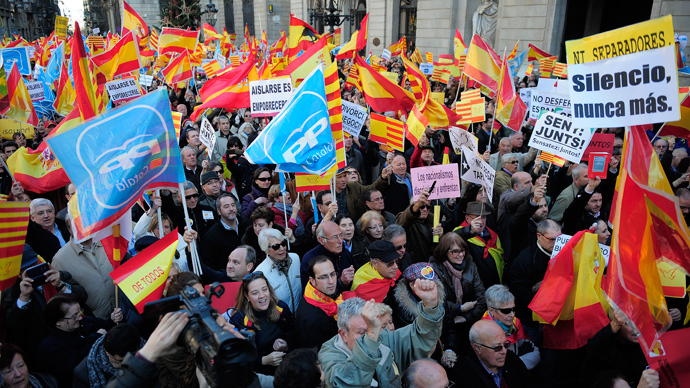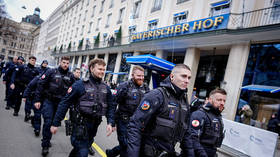Catalonia independence? Spanish Civil War redux not an option

The heated war of words over Catalonia’s fate will continue unabated, but a repeat of the Catalonia Offensive which saw tanks roll through the streets of Barcelona in 1939 will not be repeated, Catalan National Assembly member Miquel Strubell, told RT.
On Thursday, the president of the regional government in Catalonia Artur Mas said a deal had been struck between separatist groups, setting November 9, 2014 as the date for a proposed independence referendum.
Mas said the vote, would consist of two questions: ‘Do you want Catalonia to be a state?’ and ‘Do you want that state to be independent?’
The Modern day Catalan independence movement dates back to between the 1920s and 1930s, when the then-primary separatist party Estat Català was formed.
After the Spanish Civil concluded in 1939, members of Estat Català and other parties founded the Front Nacional de Catalunya which became the main pro-separatist party.
Madrid, which has long characterized the move as unconstitutional, quickly balked at the plan.
“The poll will not be held," Justice Minister Alberto Ruiz-Gallardon told Reporters after the agreement was published. Spanish Prime Minister Mariano Rajoy, who has promised to block the independence referendum, soon echoed Ruiz-Gallardon’ sentiment.
"As prime minister I have sworn to uphold the constitution and the law and, because of this, I guarantee that this referendum will not happen," Rajoy said during a joint news conference with European Council President Herman Van Rompuy.
"Any discussion or debate on this is out of the question."
Calls for independence in Catalonia, a wealthy industrial region of northeastern Spain which accounts for a fifth of the country's economic output, have continued to grow, with the country’s entrenched economic woes fueling the independence fire. But while the seemingly intractable recession has only strengthened Catalonia’s drive to manage their own affairs, Strubell says that the strive for independence isn’t about money.
RT:The Spanish government has called a referendum illegitimate. Can Catalonia still go ahead then?
Miquel Strubell: Under local law, a referendum can only be authorized by the Spanish government, and there are at least four ways in which that could happen. But there’s also a fifth root if there’s no way of reaching an agreement with Madri – when I say Madrid, I mean the Spanish government – of applying this referendum in another state as a kind of poll at the regional level under regional law.
RT:Can the Spanish government prevent a vote from happening?
In the 1960s, the Partit Socialista d'Alliberament Nacional (PSAN) was born, and over the next decade, the Catalan independence drive would take on a left-wing political bent. By the 1970s, the PSAN split into several factions, including the militant, Marxist organization Terra Lliure. The group would go on to carry out several attacks into the early 90s, although only one of those attacks resulted in a fatality which the group said was in error. Terra Lliure disbanded in 1995.
During the 1990s, pro-independence sentiment grew among several leading Catalan parties.The movement picked up steam during the next decade. Between 2003 and 2010, a leftist coalition, composed by the Catalan Socialists' Party, the pro-independence Republican Left of Catalonia and the leftist-environmentalist Initiative for Catalonia-Greens, pushed forward policies which significantly broadened Catalan autonomy.
MS: I would doubt in a European country that belongs to the Council of Europe – I’m not even saying the European Union – that a country which belongs to the Council of Europe could actually physically withdraw the ballot boxes. But that actually has been one threat that’s been held at the Catalans.
RT:If Catalonia votes for independence and Madrid refuses to recognise the vote, what sort of situation could develop? Could there be violence?
MS: I belong to a grass roots movement that was founded two years ago, which has been instrumental in organizing the two largest demonstrations in Catalonia’s history. Both of those demonstrations were for independence, and both of those demonstrations were festive, happy, looking ahead, looking forward to freedom and a better contribution to the world. So from the Catalonian end, there is no reason to suspect that violence could take place in any way at all.
I think it just involved part of the battle of. This is a war which does not involve weapons. Several people say there is a war going on, but it is certainly not a war with weaponry involved, so I think it’s just verbal threats more than anything real. If the Spanish tanks rumbled into Barcelona like they did in 1939, there just wouldn’t be enough tanks to go around, there wouldn’t be enough soldiers to go around because Spain as a modern country has drastically reduced its armed forces.

In 2010, anywhere between 1.1 million and 1.5 million came out for the 210 Catalan autonomy protest after the Spanish Constitutional Court sought to water down the 2006 Statute of Autonomy of Catalonia.
In 2012, the Catalan independence demonstration attracted between 1.5 and 2 million protesters. The protest, organized by the Catalan National Assembly, argued that Catalonia should become an independent state within the European Union.
On January 23, 2013, the Parliament of Catalonia adopted the Declaration on the Sovereignty and right to decide of the people of Catalonia, marking the "the beginning of a process by which the citizens of Catalonia will be able to choose their political future as a people." In May, the Constitutional Court of Spain provisionally suspended the declaration.
RT:Mass demonstrations during Catalonia's National Day saw hundreds of thousands take to the streets for independence - why do they think life could be better?
MS: I don’t think any people need to be asked why making their own decisions is better than having someone else make their decisions for them. I think over the last few years, there’s been a very rapid realization on the part of over half the population of Catalonia that we are not being fairly treated, money is being thrown away in vast amounts in other parts of Spain. Personally, and I think most of my colleagues would agree, this isn’t about money. This is about the much more basic issue of running our own [affairs] and determining things ourselves.
RT:Will Catalonia be able to survive as an independent state?
MS: Well, Andorra can survive on its own, it’s not too hard to survive on your own if you don’t have crippling sovereign debt for example, which is one of the issues, which obviously Spain, in the very, very end, as long as the yes vote goes ahead, will have to sit down and start being pragmatic. Right now there is a lot of saber rattling which won’t get anyone anywhere. This has been on the cards for years now. It all started before 2003, which is well before the economic crisis.
RT:Are there any other independence movements in Europe which are similar to the Catalonian independence movement?
MS: I wouldn’t like to generalize because I think each case is pretty much unique. If there are any parallels, you could talk about stateless nations inside Spain perhaps, but I wouldn’t like to draw parallels with Scotland or Flanders for that matter, and I think in other parts of Europe, there certainly are movements which would like independence, but I don’t think they have anything like the parliamentary mandate that the governors in Catalonia have now.
RT:How many Catalonians support the independence bid?
I repeat, we’re a grassroots movement, we have started doing our own surveys and a lot of qualitative work as well to see how people react to various carrots and sticks if you put it that way, but we look very closely at the statistics coming out from polls. The best poll that has been in place for several years now, which is by an independent Catalan government body, shows over half of the electorate in favor of independence, under a quarter against it, and many of the rest say they would stay at home. That’s a poll, it’s a survey, it’s not the real thing. What we’re really doing now is bolting our hatches because it’s quite possible if and when the referendum goes ahead a lot of mud will be hurled around.
The statements, views and opinions expressed in this column are solely those of the author and do not necessarily represent those of RT.












